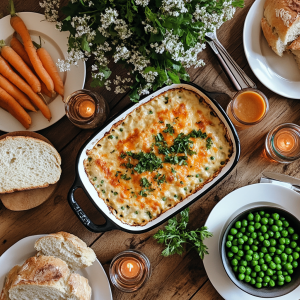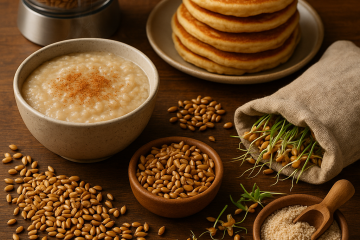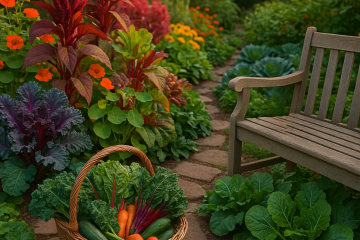
a beautiful and satisfying meal made from what they had on hand.
Prepper Outreach Contest Submission
My husband and I worked hard several years ago to make sure that we had a year’s supply of food and household products to take care of ourselves. And there are many times we have relied on those items to help us when work was thin or expenses were particularly high some months. However, we also decided to practice what it would be like to completely live off our food storage for an extended period of time. It was also an exercise to make sure we were using what we were storing and rotating through our food. In 2009, we instigated our first pantry challenge. The idea was to go for one month without shopping for food. Within a couple of weeks I knew we would have no trouble with this challenge so we extended it for two months. We came through just fine and even hosted a few dinner parties and contributed food to neighborhood events. In 2010, we decided to see what it would be like to go for three months without shopping. Again, we survived just fine.
We learned a few lessons along the way. The first is the obvious one, but reinforced the idea to store what you eat. If you don’t like the food you have stored yes, you will eat it in an emergency. But it’s better to store what you are familiar with and would eat in the first place.
We preferred our own canned and frozen food to the canned products we had purchased at the store. We still had a lot of canned food, but emptied out much of the freezer. We prefer the taste of the food we had stored to the commercially prepared products. The flavor and freshness were better. The food we put aside hadn’t been sitting on the shelves as long as the canned food we purchased.
We got by with help from our friends.
Our dinner party was aided by my mother bringing corn and a daughter bringing ice cream. My sister gave me carrots and a neighbor brought some eggs. Other friends gave lettuce, lemons or kale. The help of family and friends made our experience better. I also volunteered for three hours at a bakery and they gave me two loaves of bread.
We did better than I thought we would. When people heard of our challenge, they thought that we would have little or nothing to eat. We had plenty. We weren’t deprived. We ate well and expanded our notions of what we could do with what we already had.
Some friends thought we would lose weight, perhaps because we weren’t getting enough to eat or that we wouldn’t like what we were eating. Our weight did not change during the two months. Our hair didn’t fall out and our skin didn’t get sallow.
We will do better at storing food in the future. Knowing that storing what we will eat is critical, as we replace foods in our pantry, we will store those items that we routinely eat. Also, we will choose the healthiest food choices possible to ensure maximum health and pleasure in eating.
We can still do better about using what we have on hand. We still have a lot of food that we haven’t used or tried yet. I could probably stick to buying fresh fruits, vegetables and dairy products for the next six months to use what we have on hand.
We don’t need to be afraid of entertaining even if we are eating out of the pantry. Over the course of two months, we hosted three dinner parties, brought food to a potluck dinner party, and contributed to a meal for a family funeral. No one complained or thought what we were serving was substandard. In fact I got recipe requests for the cake I made for the funeral. Living out of the pantry doesn’t mean that you are living less. In fact, you are living more creatively.
We still wasted and threw away food. This gets back to the central mantra of store what you eat and eat what you store. The food that we threw away was squash, a few vegetables that we didn’t get to (bok choy), and old cheese. Sometimes I threw away a half of loaf of home made bread. Those containers of leftovers that lurk in the back of the refrigerator still lurk, even if you are consciously trying to only eat what you have on hand. If you don’t like it, you still aren’t going to eat it.
We need to create a hybrid diet. While we use a good amount of what we already have stored, we could certainly do better. I think we need a hybrid of buying the fresh food from the store and using the non-perishables we have on hand to make out meals. It keeps us using the products we have, rotates them for freshness, and keeps our bodies attuned to a less-processed diet.
We could plan better. It would be wise to have 10-14 meals that you can make out of what you have on hand. In reading one of Dr. Oz’s books, “The YOU Diet” I believe, he makes the point that if a person had about 14 stock recipes that they liked and were healthy, they could rotate through those and not have to worry about making poor food choices. I think there are parallels to Dr. Oz’s advice and the pantry. You should store what you could make into roughly 14 different meals. These meals could be used for dinners, with the leftovers for lunch, or used as a lunch. These would be meals that your family would enjoy eating and that you could prepare from what is on hand. I have to think what I would put on that list, but the concept seems like a good one. Of course, you also need to plan to have ingredients for various breakfasts as well. Oatmeal, granola, bottled fruit, muffins, and pancakes could be part of your list.
When we replenish our pantry, we will replenish with quality items. I was dismayed to find out that our cream of mushroom soup contained monosodium glutamate and that our syrup was made mostly of sugar. When I replenish those items, I plan to buy more carefully, checking labels to be sure of contents. The meat we took out of the freezer fed us fine, but I want to get hormone free meats and free range where possible. Why do this? Think about the reasons you would most likely draw from your pantry: unemployment, natural disaster, food shortage or strike. These are times of high stress. Adding unhealthy ingredients to a high stress time will not do much good. In times of highest stress is when we should be giving the most care to our bodies. Higher quality food equates with higher care.
This was a spring cleaner for my pantry, freezer, and cupboards. It feels great to have more space in my cupboards and freezer. I need to give them a good cleaning now that they are emptier.
An inventory is an important tool to know what you have on hand. I had a good inventory of what was in my freezer, but for the shelves of my pantry, it was more like roulette than research. I plan on keeping a better inventory of what I can this summer and how long it takes us to use it, so I can neither too much or too little. I remember generally how much I canned of each item last year and before I can again this summer, I’ll check to see how much is left before I begin canning again.
We saved money. Our monthly grocery budget is somewhere between $400 and $600 a month. It changes seasonally as we can, prepare for the holidays, eat from our CSA or garden, or entertain. We certainly saved this money during those two months. I also want to mention that we used our supplies of cleaning products, personal care, and toilet paper. I did not shop for any other these items during February and March.
Would we do this again? DEFINITELY. If you do take on such an experiment, I suggest you do it in the winter when the choices of fresh produce aren’t very interesting. Or if you participate in a CSA or have a home garden, do it then. I was very happy that our Challenge finished just as asparagus and strawberries were coming into season. It would be a shame to miss the bounty of the season for the sake of experimentation.
Give it a try for yourself. It’s not as hard as you think!


17 Comments
lilly · April 13, 2012 at 1:25 pm
This is my all time favorite..thanks for all your info.
Penny · April 13, 2012 at 4:10 pm
Wonderful tips. Thanks
Amy Hill · April 13, 2012 at 10:19 pm
What a wealth of information, Thank you.
Gwen · April 14, 2012 at 11:26 am
I liked this a lot. I especially like the part about quality food in your food storage.
There really isn’t much food value in canned food, not to mention the chemicals!. Wheat and other whole grains, beans to grind and sprout, powdered milk to make into yogurt and cheese, now there is something you can live on!
And thank for the example of practicing even though you didn’t have to. Practice make perfect, as they say.
Fran K · April 15, 2012 at 12:57 pm
Very good ! You gave me good ideas, and will be trying this soon.
Sueann · April 23, 2012 at 11:23 am
Some good tips here. Thank you for sharing!
Kandace · April 23, 2012 at 9:37 pm
I think this had a lot of great information!!
Kandace · April 23, 2012 at 9:56 pm
Good reminder about using what you have.
Ian · April 24, 2012 at 12:54 am
Really practical.
Kristie Overson · April 24, 2012 at 1:36 am
I like the idea of keeping an inventory of what is in your pantry, freezer, etc. Thanks!
Robert · April 24, 2012 at 2:20 am
Good Idea.
Robert · April 24, 2012 at 2:22 am
it mush have been hard to do.
Robert · April 24, 2012 at 2:23 am
It look fun.
Robert · April 24, 2012 at 2:24 am
and you live through it
Robert · April 24, 2012 at 2:27 am
if you are looking for a man bring it on.
Kandace · April 25, 2012 at 1:24 am
This sounds like fun!
Breelyn · April 25, 2012 at 10:32 pm
Great advice! I learned a lot from this post!
Comments are closed.